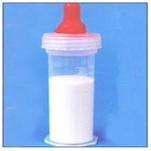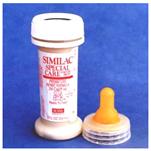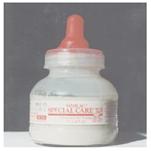미숙 신생아에게 인공영양과 모유를 먹일 때, Breast milk with Infant formula feeding for premature infants
- 만삭에 태어난 건강한 신생아들이나 큰 미숙 신생아들, 저체중 신생아들이 필요로 하는 영양분(탄수화물, 지방, 단백질, 수분, 미네랄, 비타민 A, B, C, D 등 비타민, 미네랄 그리고 성장 발육에 필요한 모든 영양분)이 모유 속에 적절히 충분히 들어 있다.
- 따라서 균형 잡힌 음식물을 충분히 섭취하는 엄마의 젖을 먹는 만삭에 태어난 신생아들에게는 종합 비타민제와 철분제를 따로 더 먹일 필요가 없다.
- 그러나 젖 먹는 미숙 신생아들은 의사의 처방에 따라 종합 비타민제와 철분을 따로 더 먹는 것이 좋다.
- 의사의 지시가 없는 한, 인공영양을 먹는 만삭에 태어난 신생아, 저체중 신생아들이나 미숙 신생아들에게는 비타민 등 다른 영양분을 더 먹일 필요가 없다. 그러나 가능한 한 초유를 꼭 먹이고 모유수유로 키우는 것이 좋다.

사진 4-98. 저체중 신생아들이나 미숙 신생아들이 인공영양을 먹기 좋게 만든 미숙 신생아용 우유병
Copyright ⓒ 2012 John Sangwon Lee, MD/, FAAP

사진 4-99. 아주 작은 미숙 신생아들이나 저체중 신생아들에게는 필요에 따라 고 칼로리 특수 포뮬라를 먹일 수 있다. 예를 들면 인공영양 30CC에 24kcl의 열량이 생성되는 미숙 신생아용 특수 인공영양도 있다.
Copyright ⓒ 2012 John Sangwon Lee, MD/, FAAP

사진 4-100. 저체중 신생아들이나 미숙 신생아들에게 먹이는 특수 인공영양. 단위용량의 인공영양에 들어있는 칼로리 양이 더 많게 제조한다.
Copyright ⓒ 2012 John Sangwon Lee,MD., FAAP
|
다음은 “미숙 신생아 영양”에 관한 인터넷 소아청소년 건강상담 질의응답의 예 입니다. |
Q.&A. ‘미숙 신생아 영양’에 관한 인터넷 질의응답
Q.
6개월 된 남자아이인데 1.7kg으로 태어나 인큐베이터에 한 달 동안 입원해 있었습니다. 퇴원해서 백일까지는 다른 아이들처럼 잘 먹고 잘 자랐는데 백일 지나면서 아기가 잘 먹지를 않습니다. 하
루에 500ml 정도 밖에 먹질 않습니다. 아기가 잘 먹는 주기가 있고, 안 먹는 주기가 있다는 말을 듣고 계속 지켜보고 이유식도 해봤으나 변함이 없습니다. 이유식을 하면 분유는 더 먹질 않습니다. 그렇다고 해서 이유식을 많이 먹지도 않습니다. 왜 그런지 걱정입니다. 좋은 말씀 있으시면 부탁드립니다.
A.
장군님
안녕하십니까. 질문해 주셔서 감사합니다.
일단, 현재 아기의 체중치, 신장치가 얼마인지.
과거의 병력, 현재병력, 가족병력, 어떤 종류의 인공영양을 몇 시간마다 하루에 몇 번 정도 먹이는지 더 자세히 알면 답변을 드리는데 많은 도움이 될 수 있습니다.
인공영양 30cc에서 칼로리 양이 얼마나 나올 수 있는지, 또 임신 몇 주에 아기를 출산하셨는지도 궁금합니다.
그런 정보가 있으면 답변을 드리는 데 도움이 됩니다.
이유식은 언제부터 먹이기 시작했고, 무슨 종류의 이유식을, 한 번에 얼마만큼, 하루에 몇 번 정도 먹이는지도 알아야 답변 드리기가 쉽습니다.
예를 들어, 인공영양 30cc에서 24칼로리의 열량이 나오는 미숙 신생아용 인공영양도 있고, 인공영양 30cc에서 20칼로리의 열량이 나오는 일반용 인공영양도 있습니다.
때문에 자녀분에게 먹이는 인공영양이 어떤 종류인지 아는 것이 중요합니다.
인공영양 30cc에서 20 칼로리의 열량이 나올 수 있는 인공영양을 먹을 때와 30cc 인공영양에서 24 칼로리의 열량이 나오는 인공영양을 먹을 때 먹는 인공영양의 섭취량은 자연적으로 적을 수 있습니다.
이유식의 섭취량이 많을수록 인공영양의 섭취량은 자연적으로 줄어들 것입니다.
체중이 7.3kg된 6개월 된 영아는 하루에 필요로 하는 평균 총 수분 섭취량이 950~1100cc이고, 1일 체중 1kg당 130~150cc의 수분을 섭취하는 것이 보통입니다. 또, 체중 1kg당 매일 필요로 하는 칼로리는 80~120칼로리입니다.
아기의 예측 체중과 신장이 성장차트에서 체중 백분위선과 신장의 백분위선을 따라 정상적으로 증가되고 있는지 알아보시기 바랍니다.
단골 소아청소년과에서 알아보시면 됩니다.
임신 몇 주에 태어난 미숙 신생아 인지 알아서 인공영양 등 이유식을 먹여야 합니다.
6개월 이후 대부분의 영아들은 분리 불안 공포증이 있을 수 있기 때문에 혼자 잠자기 아주 싫어합니다. 이 나이의 영아들은 음식물을 자신의 식성에 따라 먹는 습성이 상당히 뚜렷하게 생깁니다.
배가 고프지 않을 때 음식물을 주거나, 먹기 싫은 음식을 주면 머리를 좌우로 흔들거나, 몸과 목을 뒤로 젖혀서 음식물을 받아먹지 않습니다. 때로는 입을 꼭 다물고 있습니다.
또 채소류 주스나 과일주스류 등 이유식 음식물을 많이 먹으면 자연적으로 아기가 먹을 수 있는 인공영양의 양이 줄어듭니다.
특히 미숙 신생아에게 빈혈이 일찍 감치 그리고 심하게 더 잘생길 수 있습니다.
빈혈 등 어떤 질환이 있어도 적당한 양의 음식물을 먹지 않을 수 있습니다.
자녀의 월령이 6개월이지만 임신 월령으로 따지면 아직 6개월이 되지 않은 것입니다.
그 점을 유의해서 인공영양이나 이유식을 먹이는 것도 중요합니다.
이런저런 이유로 소아청소년과에서 검진 진단 치료를 받고 상담하시기 바랍니다.
질문이 더 있으면 또 방문하세요. 감사합니다. 이상원 드림
Breast milk with Infant formula feeding for premature infants 미숙 신생아에게 인공영양과 모유를 먹일 때
Nutrients (carbohydrates, fats, proteins, moisture, minerals, vitamins A, B, C, D, etc.) are adequately contained in breast milk.
Therefore, newborns born at full term who are breastfed by a mother who consumes enough balanced foods do not need additional multivitamins and iron supplements. However, infants who are breastfeeding are advised to take more multivitamins and iron separately according to the doctor’s prescription.
Unless directed by a doctor, full-term newborns, underweight newborns, and premature newborns who eat artificial nutrition do not need additional nutrients such as vitamins. However, it is better to feed colostrum and breastfeed as much as possible.

Photo 4-98. A milk bottle for immature newborns that makes it easier for underweight and immature newborns to eat artificial nutrition. Copyright ⓒ 2012 John Sangwon Lee, MD/, FAAP

Photo 4-99. Very small, premature, and underweight newborns can be fed a special high-calorie formula as needed. For example, there is also a special artificial nutrition for immature newborns in which 24kcl of calories are produced in 30CC of artificial nutrition. Copyright ⓒ 2012 John Sangwon Lee, MD/, FAAP

Photo 4-100. Special artificial nutrition for underweight and premature newborns. It produces more calories in a unit dose of artificial nutrition. Copyright ⓒ 2012 John Sangwon Lee, MD., FAAP
The following is an example of the online pediatric and adolescent health counseling question and answer on “nutrition for immature newborns”.
Q.&A.
Internet Q&A on “nutrition for immature newborns”
Q.
A 6-month-old boy, born 1.7kg, was hospitalized in an incubator for a month. He was discharged from the hospital, eats well and grew up like other children until 100 days, but the baby does not eat well after 100 days. Ha It only eats about 500ml in the rue. He heard that the baby has a cycle that eats well and that there is a cycle that he doesn’t eat. If you eat baby food, you don’t eat any more formula. That doesn’t mean I eat a lot of baby food. I’m worried about why. If you have any good words, please.
A.
General Hello. Thanks for asking.
First, the current baby’s weight, how much is the new device? Knowing more about your past medical history, current medical history, family medical history, and what kind of artificial nutrition you feed every few hours and how many times a day can be very helpful in giving you an answer.
I am curious about how many calories can be produced from artificial nutrition 30cc, and also how many weeks of pregnancy you gave birth to a baby.
Having such information will help us respond. When you started feeding baby food, you need to know what kind of baby food you feed, how much at a time, and how many times a day to give an answer.
For example, there are artificial nutrition for immature newborns that produce 24 calories from 30 cc of artificial nutrition, and there are also artificial nutrition for general use that produces 20 calories from 30 cc of artificial nutrition.
That’s why it’s important to know what kind of artificial nutrition you feed your children. When you eat artificial nutrition that can produce calories from 30 cc to 20 calories, and when you eat artificial nutrition that produces calories from 30 cc to artificial nutrition, the intake of artificial nutrition may be naturally small.
The more baby food you eat, the less artificial nutrition you eat. A 6-month-old infant weighing 7.3kg has an average total water intake of 950-1100cc per day, and it is common to consume 130-150cc of water per 1kg of body weight per day. Also, the daily calorie required per 1kg of body weight is 80 to 120 calories. Find out if your baby’s predicted weight and height are increasing normally along with the weight percentile and height percentile on the growth chart.
You can find out at your regular Pediatrics Department. You need to know if you are an immature newborn born in the weeks of pregnancy and feed baby food such as artificial nutrition.
After 6 months, most infants hate sleeping alone because they can have separation anxiety phobia. Infants of this age have a fairly pronounced habit of eating food, depending on their diet.
Do not give food when you are not hungry, or shake your head from side to side if you give food that you do not want to eat, or lean your body and neck back to receive food. Sometimes I keep my mouth shut. In addition, if you eat a lot of baby food foods such as vegetable juices or fruit juices, the amount of artificial nutrients your baby can eat naturally decreases.
Anemia, especially in premature newborns, can be healed early and may become more prosperous. You may not eat the right amount of food with any medical condition, such as anemia.
The child’s monthly age is 6 months, but it is not yet 6 months in terms of the age of pregnancy.
With that in mind, it is also important to feed artificial nutrition or baby food. For these and other reasons, please consult with the Department of Pediatrics and Adolescents after receiving a check-up diagnosis treatment. If you have more questions, please visit again. Thank you. Lee Sang-won. MD
출처 및 참조 문헌
- NelsonTextbook of Pediatrics 22ND Ed
- The Harriet Lane Handbook 22ND Ed
- Growth and development of the children
- Red Book 32nd Ed 2021-2024
- www.drleepediatrics.com 제1권 소아청소년 응급 의료
- www.drleepediatrics.com 제2권 소아청소년 예방
- www.drleepediatrics.com 제3권 소아청소년 성장 발육 육아
- www.drleepediatrics.com 제4권 모유,모유수유, 이유
- www.drleepediatrics.com 제5권 인공영양, 우유, 이유식, 비타민, 미네랄, 단백질, 탄수화물, 지방
- www.drleepediatrics.com 제6권 신생아 성장 발육 육아 질병
- www.drleepediatrics.com제7권 소아청소년 감염병
- www.drleepediatrics.com제8권 소아청소년 호흡기 질환
- www.drleepediatrics.com제9권 소아청소년 소화기 질환
- www.drleepediatrics.com제10권. 소아청소년 신장 비뇨 생식기 질환
- www.drleepediatrics.com제11권. 소아청소년 심장 혈관계 질환
- www.drleepediatrics.com제12권. 소아청소년 신경 정신 질환, 행동 수면 문제
- www.drleepediatrics.com제13권. 소아청소년 혈액, 림프, 종양 질환
- www.drleepediatrics.com제14권. 소아청소년 내분비, 유전, 염색체, 대사, 희귀병
- www.drleepediatrics.com제15권. 소아청소년 알레르기, 자가 면역질환
- www.drleepediatrics.com제16권. 소아청소년 정형외과 질환
- www.drleepediatrics.com제17권. 소아청소년 피부 질환
- www.drleepediatrics.com제18권. 소아청소년 이비인후(귀 코 인두 후두) 질환
- www.drleepediatrics.com제19권. 소아청소년 안과 (눈)질환
- www.drleepediatrics.com 제20권 소아청소년 이 (치아)질환
- www.drleepediatrics.com 제21권 소아청소년 가정 학교 간호
- www.drleepediatrics.com 제22권 아들 딸 이렇게 사랑해 키우세요
- www.drleepediatrics.com 제23권 사춘기 아이들의 성장 발육 질병
- www.drleepediatrics.com 제24권 소아청소년 성교육
- www.drleepediatrics.com 제25권 임신, 분만, 출산, 신생아 돌보기
- Red book 29th-31st edition 2021
- Nelson Text Book of Pediatrics 19th- 21st Edition
- The Johns Hopkins Hospital, The Harriet Lane Handbook, 22nd edition
- 응급환자관리 정담미디어
-
소아가정간호백과–부모도 반의사가 되어야 한다, 이상원
-
Neonatal Resuscitation American heart Association
-
Neonatology Jeffrey J.Pomerance, C. Joan Richardson
-
Pediatric Resuscitation Pediatric Clinics of North America, Stephen M. Schexnayder, M.D.
-
Pediatric Critical Care, Pediatric Clinics of North America, James P. Orlowski, M.D.
-
Preparation for Birth. Beverly Savage and Dianna Smith
-
Infectious disease of children, Saul Krugman, Samuel L Katz, Ann A. Gershon, Catherine Wilfert
- Pediatric Nutritional Handbook American Academy of Pediatrics
- 소아가정간호백과–부모도 반의사가 되어야 한다, 이상원
- The pregnancy Bible. By Joan stone, MD. Keith Eddleman, MD
- Neonatology Jeffrey J. Pomerance, C. Joan Richardson
- Preparation for Birth. Beverly Savage and Dianna Smith
- 임신에서 신생아 돌보기까지. 이상원
- Breastfeeding by Ruth Lawrence and Robert Lawrence
- Infectious disease of children, Saul Krugman, Samuel L Katz, Ann A. Gershon, Catherine Wilfert
- The Harriet Lane Handbook 19th Edition
- 제4권 모유, 모유수유, 이유 참조문헌 및 출처
- 제5권 인공영양, 우유, 이유, 비타민, 단백질, 지방 탄수 화물 참조문헌 및 출처
- 제6권 신생아 성장발육 양호 질병 참조문헌 및 출처
- 소아과학 대한교과서
- 그 외